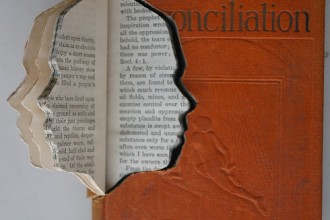Then Augustýnová the Mum died of a stroke of bad luck because she swallowed all the rings she used to wear on her fingers and by the time they found her she had gone dead.
Her name was Alenka Augustýnová.
Her sons the young Augustýns were called Tomáš and Tibor.
But they weren’t the same ones as in the German song because they were quite different Augustýns.
There’s just one thing I don’t get and that’s why old Gusto Rúhe had to write this: ‘Will write the Cemetery Book’, because I’ve no idea why I should write about the Cemetery. I’ve already written a book about the Cemetery once, but it was only short, just one page long, so maybe that’s why it wasn’t good enough and I don’t even know what happened to it.
I sent it to this man, he lives in Levice and his name is Koloman Kertész Bagala, and what he does is he asks people to write lots of different books and then he collects them, but not for Recycling but so that he can make a living out of them.
He said that there was this competition and that everyone in the world could send him any book they wrote, so I thought this was a good time for me to write the Cemetery Book, so I wrote it and I sent it to him but I never heard back from him but Koloman Kertész Bagala has to write to me and tell me what’s happened to my Cemetery Book because that’s the law, right?
Right.
The thing is, I don’t want to say anything against him, because maybe my biggest mistake was that it was only one page long, because it’s true that books usually have more pages, so maybe he just thought it wasn’t long enough. But now Ján Boš-Mojš is mending my handcart and in addition to that it’s raining outside, so I’ve got time to write a longer book. But there’s just one thing I don’t get, why it’s got to be about a Cemetery? Nobody in the world can write a longer book about a Cemetery than my first Cemetery Book, because what can you write about a Cemetery, right?
Right.
Because I’m no retard, I’ve seen all sorts of books and I’ve read all sorts of books too, especially the one that was the most beautiful book in the world. It was called The Young Pioneer’s Heart and it was about this boy who wanted to be a Young Pioneer, but the baddie wouldn’t let him. That was the most beautiful book in the world and sometimes I think that no other book in the world can be more beautiful than The Young Pioneer’s Heart. I used to cry every time I read it but it was OK to cry then because we still had the Communist Party.
I was given The Young Pioneer’s Heart at school because I came top at collecting waste paper and inside the book it said that it was dedicated to Samuel Tále by the Young Pioneers in honour of his outstanding achievements in collecting waste paper.
Ivana used to make fun of this book, because she’s my sister and she’s a great artist from Bratislava but I hate it when people laugh at things that you’re not supposed to make fun of.
For example, Alf Névéry never laughed at this book, but he was very weird like that because he never laughed at anything that was funny and he always laughed at things that weren’t funny at all. I don’t know why he was like that, maybe because he wasn’t humorous because there are people like him that aren’t humorous.
But I’m very humorous.
And the way you can tell that I’m humorous is due to lots of different humorous sentences that I know. Some of them are in foreign languages too because I’ve got I.Q. Like in English I can say Fuck me tender fuck me do. That’s humorous.
Or I can say ‘Eins, zwei, drei, du bist arsehole’. That’s humorous in German. But the most humorous sentence of all is the one this actor from the Hungarian Regional Theatre in Košice taught me. His name was Bátori and he was from Bátorove Kosihy. And the sentence goes like this:
Attention, attention, there’ll be no concert, because that cunt Volodya nicked the balalaika.
This sentence is in Russian, and every time we met in the street, Bátori used to go like this:
‘So is the balalaika concert on, Samko?’
And I used to go like this:
‘There’ll be no concert, because that cunt Volodya nicked the balalaika.’
Meaning we’re humorous and people can have a good laugh.
I always had a good laugh, too.
Then Bátori got diabetes and they had to cut his legs off. And after that he couldn’t be an actor in The Hungarian Regional Theatre any more. His name was Károly Bátori.





[…] "Today I’ve become a writer again because it’s raining, and when it’s raining I can’t collect cardboard, because it’s raining." Story of the Week (February 28), by Daniela Kapitáňová. Translated from Slovak by Julia Sherwood. […]